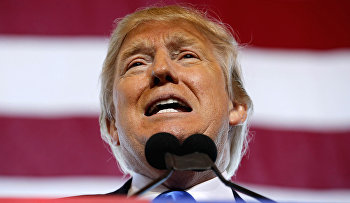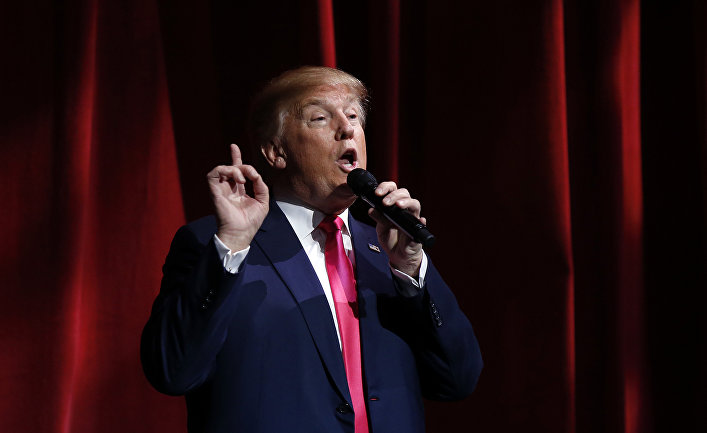Barack Obama gave his traditional annual address before the US Congress. This was his last such address as American President. Obama talked about both domestic politics and foreign affairs. Yet the President's address was like one of the worn-out speeches given by Soviet General Secretary Brezhnev – a rambling jumble of formulaic utterances entirely divorced from reality.
What we gathered from the President's speech is that Washington is officially worried by both Russia and China – particularly that these countries don't upset America's monopoly in the international arena, or overturn the New World Order – far more than any thoughts about the struggle against international terrorism. In its role as standard-bearer for democracy, free market and economy, and the sanctity of human rights, the USA strives to maintain a monopolistic position in world affairs which entirely contradicts the hierarchy of values for which it claims to fight.
Obama's address was shot-through with the rhetoric of confrontation, domination, intolerance and isolationism. The underlining thesis was that of American Exceptionalism, without the slightest concept of democracy – because democracy involves cooperation, tolerance, and fair competition. The world would be a far safer place if only the US could learn to cooperate with Russia, China, the EU, Iran, and other world centers – instead of confronting them. Peace and stable development are only possible in a multi-polar world. The experience of the past 25 years shows what the results are, when one of the world's nations grabs a monopolistic position in international affairs.
The situation in the Middle East typifies the results of the monopolistic, irresponsible, cynical, acquisitive and short-sighted policies of the United States. The gestation of the Islamic State, and other extremist terrorist groups is a direct result of American hegemony. Of course, nobody in Washington wanted any of that to happen, which is why they are rapidly trying to change course – and battle more with Russia, than with terrorism.
One of the dumbest lines from his presidency — Obama ridiculed for saying conflicts in MidEast “date back millennia” https://t.co/Q3IMjCeYzC
— سلطان سعود القاسمي (@SultanAlQassemi) January 14, 2016
The more they drone on about American Exceptionalism, the US's destiny of supremacy, and their confrontation with Russia, the greater terrorism will flourish, and the more frequent will be the occurrence of atrocities that discredit the entire idea of American democracy. It's no coincidence that Soviet leaders, too, loved to talk about the unique role of the USSR and its leading role in the international arena. They too talked of Afghanistan as their “international responsibility,” and inveighed against the US in exactly the way the US now browbeats Russia. Washington defends Kiev and its other 'client states' and harangues Moscow – while Obama carelessly named Ukraine as a 'client state' in his Congress address.
“We will continue to support Ukraine in its efforts for the defense of democracy,” Obama said in his speech to Congress. If what the USA is doing in Ukraine nowadays can be called a 'defense of democracy', it would be hard to imagine anything more likely to smear democracy's reputation more thoroughly. What Obama's speech really showed is why Donald Trump's popularity in America is advancing by leaps and bounds. Trump avoids boilerplate phraseology and rhetoric that's divorced from reality. He is no kind of demagogue.
Trump said he didn't mind if Russia went into Syria! A month later Russia went into Syria shaming prez Obama!
— Trump 2016! (@risetoflyy) January 24, 2016
Trump's high ratings come down to the fact that he sees ways to solve America's international relations with Russia and other nations – rather than ramping up the rhetoric against them. Average Americans figured out long ago that the Cold War standoff finished long ago, and what Washington is peddling these days is way past its shelf-life date. There are many, too, who understand that positive improvements in the world, and success in the battle against terrorist infestation ought to bring Russia and America together as partners, and not as foes. Trump is actively backing this way of thinking.

The choices Americans make in their choice of President in the upcoming elections will reflect directly on world change. One thing is clear – the apologist-in-chief for Democracy shouldn't emerge from a tiny number of elite political families. Since the end of the 1980s until the advent of Barack Obama, the role of President has been overcrowded by members of the Bush and Clinton families.
Today the list of candidates for the presidency we see those surnames written large. One is the brother of a former president, while another is the wife of an ex-president. If the US elects either of these two, it would be hard to distinguish the United States from a regressive republic led by a dynasty of rulers. For example, the leadership of Azerbaijan has passed from father to son, leading the US to heap fair criticism that Azerbaijan is turning into a sultanate in which democracy and human rights are in woeful disarray – and is even considering using sanctions against the Aliyev regime. It all means that when Americans eventually go to the ballot box, there will be a lot at stake.






